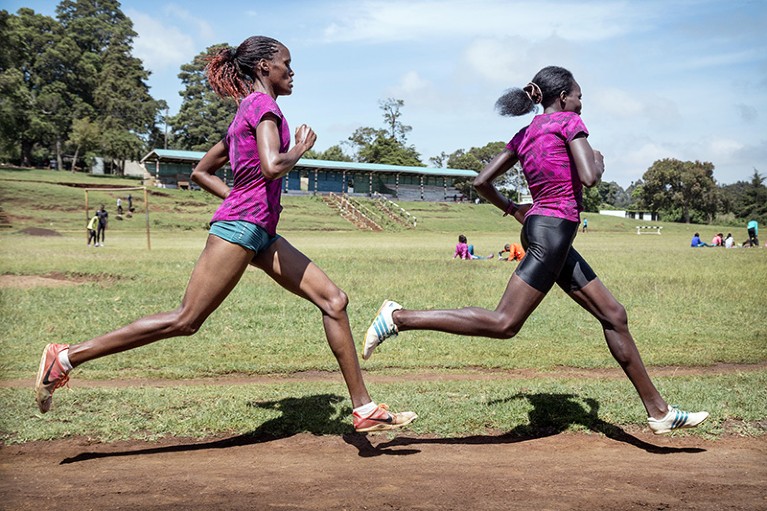
Kenyan athletes are often subject to debate over their supposed genetic advantage at distance running.Credit: Sven Torfinn
Skin Deep: Journeys in the Divisive Science of Race Gavin Evans OneWorld (2019)
Hitchhiking in Zimbabwe in 1981, Gavin Evans encountered an English-speaking couple who told him that the mental capacity of black Africans was so limited that they would never invent anything. Evans, who is white, grew up in apartheid South Africa. As he writes in his book Skin Deep (joining his 2014 Black Brain, White Brain), his “reassuringly pale skin” made him privy to the everyday prejudice of other white people who had been “breast-fed on racism”. Many assumed he would share their loathsome views. He did not. Horrified, he became determined to fight prejudice through his writing.
In Skin Deep, the writer and media lecturer dissects the dubious pseudoscientific arguments still used to justify racism. In my latest book, Superior, I cover similar ground (see R. Nelson Nature 570, 440–441; 2019). Given that Stephen Jay Gould’s critique of biological determinism The Mismeasure of Man was published in 1981 — almost 40 years ago — you might think it’s no longer necessary to reassert that there is no genetic basis for what people think of as race.
Racism in science: the taint that lingers
But today’s political environment reminds us that the concept of deep, unassailable differences between population groups persists. Race ‘science’ — that is, research that looks at the existence and scope of these differences — has to some extent been purged from biology. The vast majority of human genetic variation is today understood to be individual — that is, people from different populations can easily be more similar, genetically, than people from the same population. But the persistence of everyday racism, the perception of regional cultural differences and the use of racial categories such as ‘Caucasian’ in medicine, employment and official data-gathering blind too many to this fact.
Evans zooms in on two focal points of racial stereotypes: sport and intelligence. His section on the success of Kenyan marathon runners in global contests is brilliant: it demolishes the idea of genetic explanations for any region’s sporting achievements. Some have speculated that Kenyans might have, on average, longer, thinner legs than other people, or differences in heart and muscle function. Evans notes, however, that we don’t make such generalizations about white British athletes when they do disproportionately well in global athletics. Such claims for athletic prowess are lazy biological essentialism, heavily doped with racism.
True complexity
On intelligence, Evans dissects the work of twins researcher Robert Plomin, who has made the claim that IQ is highly heritable (see N. Comfort Nature 561, 461–463; 2018). Some have interpreted that as implying that there are genetic differences between population groups. But IQ is malleable. As Evans points out, “One of the best ways to improve IQ if you are from a poor family is to get adopted as a baby”. Adoption into well-off families is associated with IQ gains of as much as 12–18 points. Research has shown that IQ testing still fails to capture the true complexity and variation in human intellect.

Potential immigrants undergo intelligence testing at the Ellis Island inspection station in the 1920s.Credit: Granger Historical Picture Archive/Alamy
As a white South African, Evans has not experienced the hard end of apartheid. But his lifelong familiarity with the countries of southern Africa is his strength. A problem that plagues writing on the science of human difference is that some authors — particularly in Europe and the United States — have scant understanding of history, cultures and environments beyond their own. Race cannot be discussed without appreciating the subtle effects of language, politics, habits, religion and diet, which constitute the bulk of what many perceive to be ‘racial’ difference. I read too many popular-science books that treat these factors as peripheral, as if having a grasp of genetics is all you need to debunk scientific racism. With his sensitive knowledge of place and people, Evans avoids this trap.
The politics of our age demand that we counteract ‘scientific’ racism not only with rigour, depth and empathy, but also without fear. Evans takes no prisoners. He skewers the psychologist Steven Pinker, for instance, for entertaining the theories of anthropologists Gregory Cochran, Jason Hardy and the late Henry Harpending, who claim that evolutionary pressures have led to psychological differences between populations. In 2009, at the ‘Preserving Western Civilization’ conference in Baltimore, Maryland, Harpending stated, bizarrely: “I’ve never seen anyone with a hobby in Africa.” Evans goes on to damn US psychologists more generally as giving a “faux-scientific gloss to unscientific assumptions”, particularly that IQ is a rigorous or reliable measure of intelligence.
Genetic determinism rides again
There are also those who betray a deep internalized bias of which they’re not aware. To answer the bigger question of why people are racist, a useful companion to this book is Biased (2019) by psychologist Jennifer Eberhardt. She explains how stereotypes become rooted in all of us from such a young age that, as adults, abandoning these world views takes prolonged, conscious effort.
And then there are those whose prejudice is deliberate, motivated by hatred and politics. The danger is that it’s not always easy to spot them. In trying to gain a foothold in academia, ‘scientific’ racists often adopt the language of scholarly debate. They might call for more academic freedom and ‘diversity of opinion’, complaining that mainstream scientists and the media are trying to silence them. Evans calls out this duplicity. He pours scorn on those who attempt to mask their prejudice in a “martyr complex — the sense that they are the intrepid truth-tellers, following the scientific breadcrumbs”.
Evans’s work is bold, but one problem I have with it is that he seems to fail to appreciate that racists do not become racist because a faithful examination of the science has convinced them that certain populations are inferior to others. In reality, they were convinced of it from the start. Arguing with racists on points of fact is a game with no winners. Debating with them on their own terms, as Evans does, serves only as grist to their mill.
Racist ‘science’ must be seen for what it is: a way of rationalizing long-standing prejudices, to prop up a particular vision of society as racists would like it to be. It is about power. This is why, historically, work claiming to show deep racial differences has been of dismal quality. Racists don’t care if their data are weak and theories shoddy. They need only the thinnest veneer of scientific respectability to convince the unwitting. That said, we still need scientific arguments refuting biological race, of the sort found in Skin Deep. We can only hope that people unaware of the falsity of the racial views they hold might read such books, and become less susceptible to manipulation by hardened racists with political agendas.
A world in thrall to far-right politics and ethnic nationalism demands vigilance. We must guard science against abuse and reinforce the essential unity of the human species. I am grateful that in Evans we have someone conscientious, brave and willing to do that.

 Racism in science: the taint that lingers
Racism in science: the taint that lingers
 Genetic determinism rides again
Genetic determinism rides again






